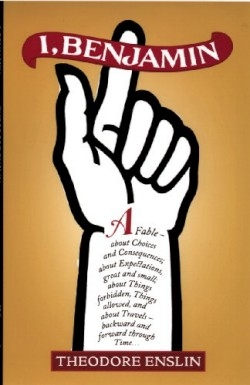I, Benjamin
- 2010 INDIES Finalist
- Finalist, Fantasy (Adult Fiction)
“I experimented with various ‘fingers’ from my wrist, and found it possible to go to numerous places beyond the grasslands,” Benjamin says. “There was a large pond…I could see the farther hills where I had spent time among the windmills. But all of the horizons appeared to end with a clearly defined dropoff—the ravine.” Such are the confines of Benjamin’s world when he chooses a life of solitude, and the landscape of poet Theodore Enslin’s quasi-biographical novella. Here, readers are invited to explore a fantastical world discovered by following the path “of the left wrist,” wherein time is without measurement and the needs of the artist are met by a sort of providence.
One of the most musical of the avant-garde poets, and the author of over seventy books spanning better than fifty years, Theodore Enslin studied music composition with Nadia Boulanger, an honor he shared with such renowned composers as Aaron Copeland and Philip Glass. Turning his compositional talents to language rather than music, Enslin composed poems whose rhythm and sound-play informed the meaning such that the language became music. In this novel, we hear echoes of the author’s life story: Enslin’s relationship with music, his life living in the woods, even his later occupation of making walking sticks are all referenced.
Other aspects of the story are more surreal. We meet the woman Lark, a young girl in the morning, a beautiful, middle-aged soprano in the afternoon, and an elderly woman in the evening. Lark cares for Benjamin, preparing his meals, caring for his home and providing guidance while he explores the land and creates music. Time passes without aging him, but not indefinitely. One of the most interesting movements of the story is when Benjamin must return to the world as we know it: “Something, perhaps wind or water, had lifted and carried me away, again in a daze…I was aware of the passage of time in a way that I had almost forgotten. I looked at my hands. They were the hands of an old man.”
Enslin’s story, a pilgrimage from “Exurbia” to solitary life in the woods and his subsequent journey back, is reminiscent of Thoreau. The narrative, which approaches allegory, oscillates between a dreamy sublimity and Spartan intention. Running through this ethereal story are more austere currents: the limitations of time and body, and the despair of loneliness. Fans of the poet will of course be fascinated by the journey, but more broadly, this exploration offers an intriguing sojourn to those interested in metaphysical travel or in the life cycle of an artist.
Disclosure: This article is not an endorsement, but a review. The publisher of this book provided free copies of the book to have their book reviewed by a professional reviewer. No fee was paid by the publisher for this review. Foreword Reviews only recommends books that we love. Foreword Magazine, Inc. is disclosing this in accordance with the Federal Trade Commission’s 16 CFR, Part 255.

